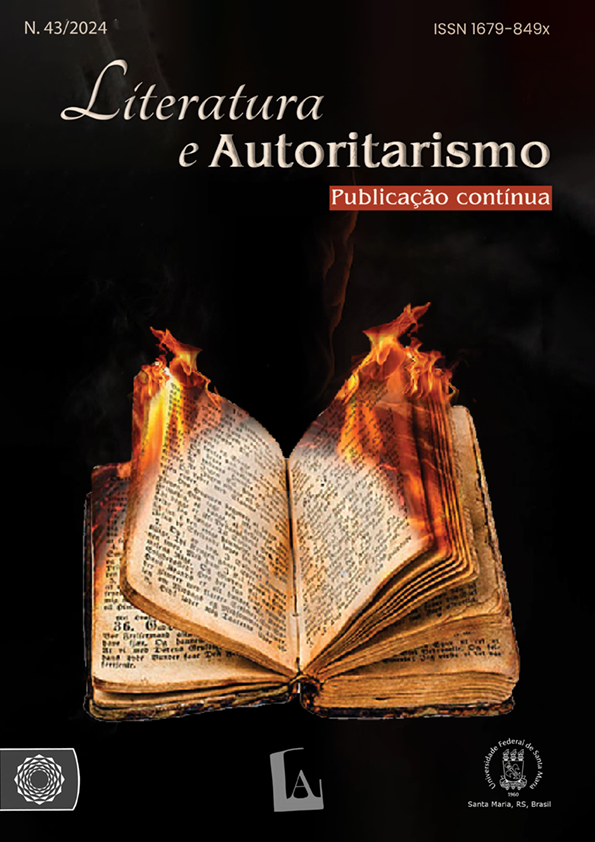O som do rugido da onça: reescrever a história pelo encantamento do mundo
DOI:
https://doi.org/10.5902/1679849X86746Palavras-chave:
Micheliny Verunshk, História, Iluminismo, Colonialismo, ReescritaResumo
O romance O som do rugido da onça (VERUNSHK, 2021) narra a morte da menina Iñe-e. Criança indígena da tribo Miranha, a menina foi entregue por seu pai a dois pesquisadores para ser levada à Alemanha junto a outras crianças originárias, onde seriam exibidas como exemplo da fauna para a corte do país. A narração desse rapto é baseada em relatos historiográficos sobre a expedição do zoólogo Johann Baptist von Spix e do botânico Carl Friedrich Martius, considerados dois dos mais “famosos e importantes viajantes que desembarcaram no Brasil [...] [cuja viagem] propiciou a mais completa exploração da fauna e da flora brasileira até os dias de hoje” (LIMA, 2019). Este artigo analisa como a obra subverte a narrativa de uma historiografia hegemônica, escrita na perspectiva dos sequestradores-cientistas, a partir da mobilização da inserção de cosmovisões de povos originários. Essas cosmovisões surgem, ao longo do romance, como “rasuras” na história, e permitem que a personagem de Iñe-e compreenda seu lugar em um mundo onde indígenas como ela foram massacrados e explorados no processo colonizatório. Esse encantamento também permite a outra personagem, Josefa, situada na atualidade, voltar a pensar em si e rever suas origens historicamente e discursivamente apagadas. A argumentação elabora as conclusões: 1) de que a história não é linear nem homogênea; 2) o Iluminismo promoveu um desencantamento do mundo, substituindo a imaginação pelo saber para justificar uma série de violências coloniais; 3) se a realidade é dependente da ação humana, ela é passível de intervenção para sua modificação.
Downloads
Referências
ADORNO, T. W.; HORKHEIMER, M. Dialética do Esclarecimento: fragmentos filosóficos. Rio de Janeiro: Jorge Zahar, 1985.
CUNHA, M. C.; VIVEIROS DE CASTRO, E. Vingança e temporalidade: os Tupinambá. In: CUNHA, Manuela Carneiro. Cultura com aspas e outros ensaios. São Paulo: Ubu, 2017. p. 78-101.
DIDI-HUBERMAN, G. Sobrevivência dos vaga-lumes. Traduzido por Márcia Arbex. Belo Horizonte: Editora UFMG, 2011.
LIMA, A. S. SPIX, MARTIUS E O LEGADO HISTÓRICO-CIENTÍFICO-FICCIONAL DAS VIAGENS. Blog da BBM. [S. l], 18 jul. 2019. Disponível em: https://blog.bbm.usp.br/2019/spix-martius-e-o-legado-historico-cientifico-ficcional-das-viagens/#:~:text=O%20zo%C3%B3logo%20Johann%20Baptist%20von,que%20j%C3%A1%20desembarcaram%20no%20Brasil.
KRENAK, A. Ideias para adiar o fim do mundo. São Paulo: Companhia das Letras, 2019.
KRENAK, A. Futuro ancestral. São Paulo: Companhia das Letras, 2022.
LOWY, M. Walter Benjamin: aviso de incêndio: uma leitura das teses "Sobre o conceito de história". São Paulo: Boitempo, 2005.
MACIEL, M. E. Animalidades: zooliteratura e os limites do humano. São Paulo: Instante, 2022.
MAFFFESOLI, M. O Tempo das Tribos: O declínio do individualismo nas sociedades de massa. 5. ed. Rio de Janeiro: Forense Universitária, 2014.
MIGNOLO, W; WALSH, C. On decoloniality: concepts, analytics, praxis. Durham: Duke University Press, 2018.
OLIVEIRA, R. P. DE; CAIMI, C. L. Imaginário afro-ameríndio e utopia política em Torto arado. Estudos de Literatura Brasileira Contemporânea, n. 67, 2022.
SCHØLLHAMMER, K. E. Ficção brasileira contemporânea. Rio de Janeiro: Civilização Brasileira, 2009.
SILVA, T. S.; HALL, S.; WOODWARD, K. Identidade e diferença. Rio de Janeiro: Vozes, 2014.
Spix, Martius e o legado histórico-científico-ficcional das Viagens – Blog da BBM. Disponível em: https://blog.bbm.usp.br/2019/spix-martius-e-o-legado- historico-cientifico-ficcional-das-viagens/.
VERGÈS, F. Decolonizar o museu. Programa de desordem absoluta. São Paulo: Ubu, 2023.
VERUNSHK, M. O som do rugido da onça. São Paulo: Companhia das Letras, 2021.
Downloads
Publicado
Como Citar
Edição
Seção
Licença
Copyright (c) 2024 Literatura e Autoritarismo

Este trabalho está licenciado sob uma licença Creative Commons Attribution-NonCommercial-ShareAlike 4.0 International License.
DECLARAÇÃO DE ORIGINALIDADE E EXCLUSIVIDADE E CESSÃO DE DIREITOS AUTORAIS
Declaro que o presente artigo é original e não foi submetido à publicação em qualquer outro periódico nacional ou internacional, quer seja em parte ou na íntegra. Declaro, ainda, que após publicado pela Literatura e Autoritarismo, ele jamais será submetido a outro periódico. Também tenho ciência que a submissão dos originais à Literatura e Autoritarismo implica transferência dos direitos autorais da publicação digital. A não observância desse compromisso submeterá o infrator a sanções e penas previstas na Lei de Proteção de Direitos Autorais (nº 9610, de 19/02/98).






